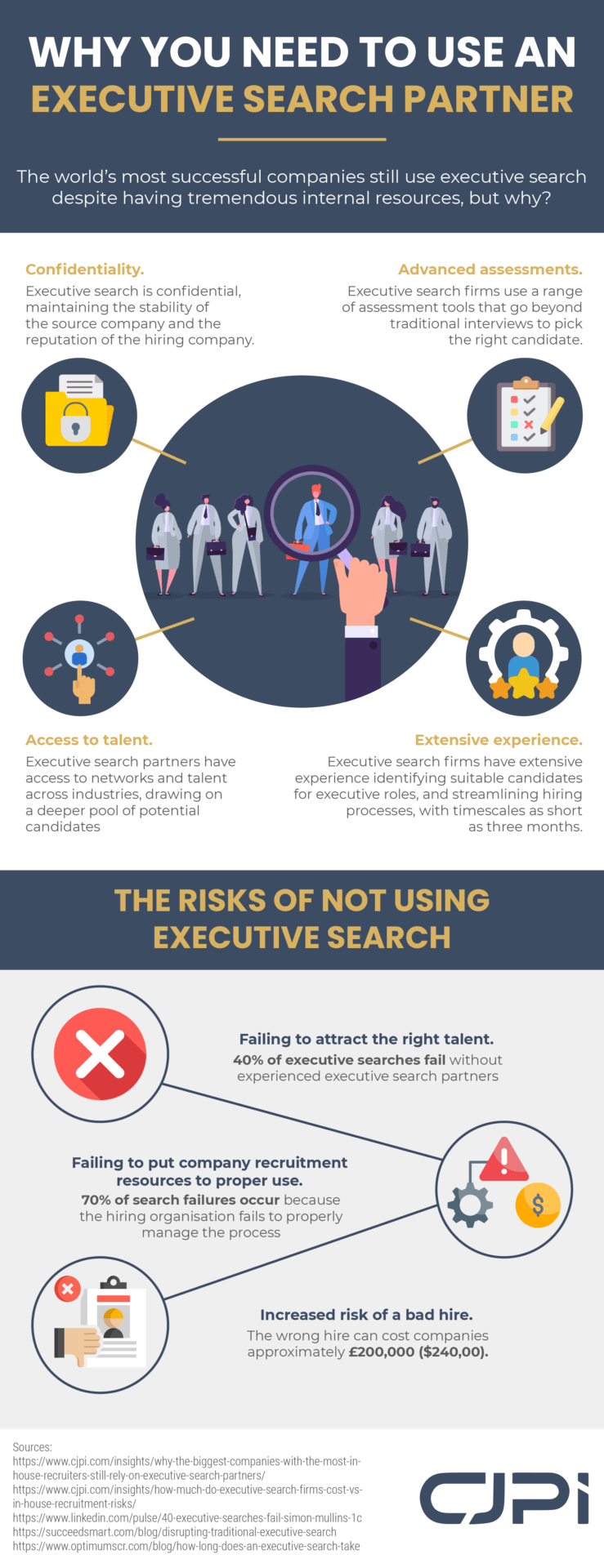A recent survey uncovered that every single Fortune 500 and FTSE 100 company partners with executive search firms, despite having more in-house recruitment expertise and capabilities than most companies who try to recruit executives themselves.
Here’s Why…

The paradox of scale
It may seem counterintuitive. The world’s largest companies often have entire divisions dedicated to talent acquisition, sometimes running into hundreds of in-house recruiters. They have sophisticated HR technology stacks, powerful employer brands and global reach. Yet, despite these resources, they continue to invest heavily in external executive search partners.
Beyond filling roles
At a senior level, recruitment is not just about process efficiency or filling headcount. It is about leadership, strategy, and risk. Executive appointments have an outsized impact on the trajectory of the organisation, so boards and investors demand rigour that goes beyond what an internal recruitment team is typically designed to deliver.
Confidentiality
Confidentiality is paramount when it comes to executive searches, especially for senior-level roles. Hiring processes can impact the stability of an organisation and the morale of its employees. By partnering with executive search firms, top companies can ensure utmost confidentiality throughout the recruitment process.
Think of it this way: how likely is it that a senior leader within a competitor organisation will proactively engage with an internal recruiter at that competitor’s organisation? Far more likely is a private conversation with a director-level consultant from an independent executive search firm with a proven track record of working at this level and protecting privacy.
A professional search firm ensures not only that the entire passive talent market is addressed, but also that active candidates feel confident to engage with an opportunity without reputational risk.
Experience with executive roles
Executive search partners bring a wealth of experience in hiring strategically significant leaders. Their deep understanding of executive roles allows them to identify candidates with the right skills, qualifications, and cultural alignment.
Most internal recruiters may never have recruited for a CxO role. Demand is rare, turnover low, and the stakes extremely high. If an organisation last hired a Group CFO or Chief Technology Officer a decade ago, should that process be left to an internal team with no direct experience of these hires? The reality is, the biggest companies don’t. They turn to search firms that work on these roles exclusively, every day.
You only get one shot at great leadership. The risk of getting it wrong far outweighs the investment in professional consultants who maximise the chance of getting it right.
Rigorous assessment
Executive search is not simply about introducing candidates; it is about evaluating them thoroughly. Search firms deploy assessment tools beyond the reach of most internal teams – psychometric testing, behavioural profiling, structured referencing and leadership diagnostics. These approaches provide objective, data-driven insights into leadership style, potential, and risk.
Importantly, the role of the search consultant is consultative. They are not limited to finding the best candidate who has applied, but rather aligning the organisation’s goals with the very best talent in the market — whether that person is looking for a job or not.
Access to networks and talent
One of the most traditional, yet enduring, advantages of executive search is access. Search firms cultivate relationships with senior leaders across sectors and geographies, providing unmatched reach into the passive talent pool. These networks cannot be replicated overnight by even the largest in-house teams.
This access ensures that organisations do not just compete for visible candidates, but reach hidden talent who are not on the market, yet may represent the best fit for their leadership needs.
Credibility with the board
Boards, investors and remuneration committees often expect to see an independent search partner involved. Their participation demonstrates rigour, reduces risk of bias, and reassures stakeholders that every avenue has been explored. It also creates an independent audit trail should an appointment later come under scrutiny.
The cost of getting it wrong
For global corporations, the financial and strategic impact of a failed executive hire can be catastrophic. In this context, the investment in an executive search partner represents not an expense but a form of insurance — ensuring that leadership decisions are made with the best possible information and insight.
In partnership, not in competition
The role of executive search is not to displace in-house talent teams, but to complement them. Internal recruiters manage scale, employer brand, and hiring efficiency across the business. Search partners bring specialism, discretion and reach to the most critical leadership roles. Together, they form a balanced approach to building the leadership bench strength of the world’s biggest companies.
Do you like our Infographic? Feel free to use our embed code to insert it into your blog, article or website:
<a href="https://www.cjpi.com/insights/why-the-biggest-companies-with-the-most-in-house-recruiters-still-rely-on-executive-search-partners/"><img style="width:100%;" src="https://www.cjpi.com/wp-content/uploads/2023/11/WhyYouNeedExecSearch.png"></a>


